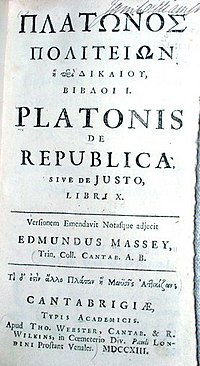Psychoanalytic
The Republic
by: Plato

Synopsis
The Republic (Greek: Πολιτεία, Politeia) is a Socratic dialogue written by Plato around 380 BC concerning the definition of the order and character of the just city-state and the just man.[1] The dramatic date of the dialogue has been much debated and though it must take place some time during the Peloponnesian War, "there would be jarring anachronisms if any of the candidate specific dates between 432 and 404 were assigned".[2] It is Plato's best-known work and has proven to be one of the most intellectually and historically influential works of philosophy and political theory.[3][4] In it, Socrates along with various Athenians and foreigners discuss the meaning of justice and examine whether or not the just man is happier than the unjust man by considering a series of different cities coming into existence "in speech", culminating in a city (Kallipolis) ruled by philosopher-kings; and by examining the nature of existing regimes. The participants also discuss the theory of forms, the immortality of thesoul, and the roles of the philosopher and of poetry in society.
Criticism
The Republic was more on the political side of the city- state. It was based merely on the fact because the psychoanalytic factor was centered on the characters, It seeks the evidence of Plato's unresolved emotions regarding the establishment of a just city-state and its order and character. the emotion that prevailed in his work based on the reader's reaction is basically the happiness and contentment of a man. If the just man is happier than the unjust. The Republic takes a part as an object of analysis on Plato's life his anxieties about the problems on his time and how the intellectuals debated concerning the issue.


No comments:
Post a Comment